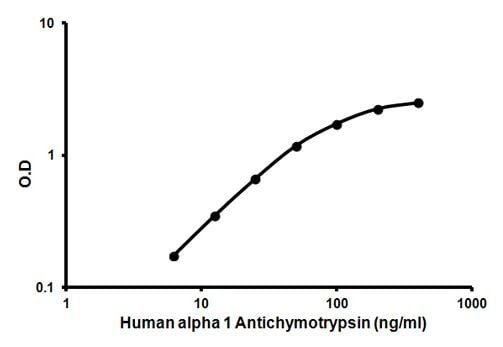Human alpha 1 Antichymotrypsin ELISA Kit (ab157706)
Key features and details
- Sensitivity: 1.7215 ng/ml
- Range: 6.25 ng/ml - 400 ng/ml
- Sample type: Other biological fluids, Plasma, Serum
- Detection method: Colorimetric
- Assay type: Sandwich (quantitative)
- Reacts with: Human
Overview
-
Product name
Human alpha 1 Antichymotrypsin ELISA Kit
See all AACT kits -
Detection method
Colorimetric -
Precision
Intra-assay Sample n Mean SD CV% Overall Inter-assay Sample n Mean SD CV% Overall -
Sample type
Serum, Plasma, Other biological fluids -
Assay type
Sandwich (quantitative) -
Sensitivity
1.7215 ng/ml -
Range
6.25 ng/ml - 400 ng/ml -
Recovery
> 85 %
Sample specific recovery Sample type Average % Range Serum > 85 % - % -
Assay duration
Multiple steps standard assay -
Species reactivity
Reacts with: Human -
Product overview
Abcam's alpha 1 Antichymotrypsin Human ELISA Kit is an in vitro enzyme-linked immunosorbent assay (ELISA) for the quantitative measurement of alpha 1 Antichymotrypsin levels in Human serum and plasma.
In this assay the alpha 1 Antichymotrypsin present in samples reacts with the anti-alpha 1 Antichymotrypsin antibodies which have been adsorbed to the surface of polystyrene microtiter wells. After the removal of unbound proteins by washing, anti-alpha 1 Antichymotrypsin antibodies conjugated with horseradish peroxidase (HRP), are added. These enzyme-labeled antibodies form complexes with the previously bound alpha 1 Antichymotrypsin. Following another washing step, the enzyme bound to the immunosorbent is assayed by the addition of a chromogenic substrate, 3,3’,5,5’-tetramethylbenzidine (TMB). The quantity of bound enzyme varies directly with the concentration of alpha 1 Antichymotrypsin in the sample tested; thus, the absorbance, at 450 nm, is a measure of the concentration of alpha 1 Antichymotrypsin in the test sample. The quantity of alpha 1 Antichymotrypsin in the test sample can be interpolated from the standard curve constructed from the standards, and corrected for sample dilution.
Get results in 90 minutes with Human Alpha 1-antichymotrypsin ELISA Kit (ab171574) from our SimpleStep ELISA® range.
-
Platform
Microplate
Properties
-
Storage instructions
Store at +4°C. Please refer to protocols. -
Components 1 x 96 tests 100X HRP-conjugated anti-Human alpha 1 Antichymotrypsin antibody 1 x 150µl 20X Wash Buffer Concentrate 1 x 50ml 5X Diluent Concentrate 1 x 50ml Chromogen Substrate Solution 1 x 12ml Human alpha 1 Antichymotrypsin Calibrator (lyophilized) 1 vial Human alpha 1 Antichymotrypsin ELISA Microplate 1 unit Stop Solution 1 x 12ml -
Research areas
-
Function
Although its physiological function is unclear, it can inhibit neutrophil cathepsin G and mast cell chymase, both of which can convert angiotensin-1 to the active angiotensin-2. -
Tissue specificity
Plasma. Synthesized in the liver. Like the related alpha-1-antitrypsin, its concentration increases in the acute phase of inflammation or infection. Found in the amyloid plaques from the hippocampus of Alzheimer disease brains. -
Involvement in disease
Defects in SERPINA3 may be a cause of chronic obstructive pulmonary disease (COPD) [MIM:107280]. -
Sequence similarities
Belongs to the serpin family. -
Domain
The reactive center loop (RCL) extends out from the body of the protein and directs binding to the target protease. The protease cleaves the serpin at the reactive site within the RCL, establishing a covalent linkage between the carboxyl group of the serpin reactive site and the serine hydroxyl of the protease. The resulting inactive serpin-protease complex is highly stable. -
Cellular localization
Secreted. - Information by UniProt
-
Alternative names
- SERPINA3
- AACT
- AACT_HUMAN
see all -
Database links
- Entrez Gene: 12 Human
- Omim: 107280 Human
- SwissProt: P01011 Human
- Unigene: 534293 Human
- Unigene: 710488 Human







